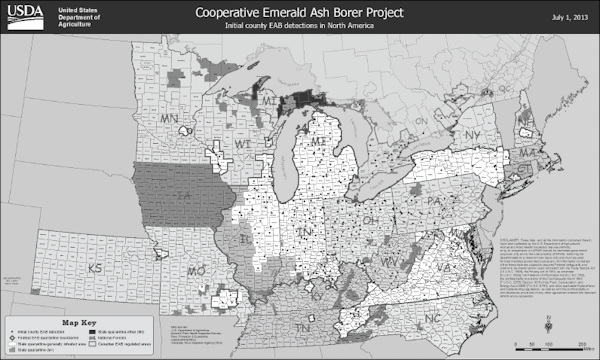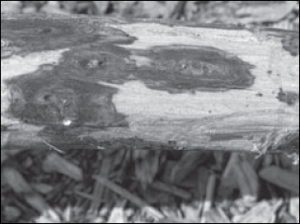Green Horizons
Volume 17, Number 2Summer 2013
to protect Missouri trees
By Brian Schweiss, Forestry Field Program Supervisor
Ash wood product quarantine expanded to limit spread of Emerald Ash Borer
The Missouri Department of Agriculture has expanded the state's quarantine regulating themovement of many ash wood products. The quarantine, an effort to reduce the spread of the Emerald Ash Borer, a one-half inch long emerald green-colored beetle, now includes the counties in which the borer has been previously found as well as two additional counties.
The quarantine expansion comes as a result of borers identified and confirmed by USDA staff during routine survey efforts this month. The borers were found in Bollinger County in southeastern Missouri and Pulaski County in south-central Missouri.
The quarantine limits the movement of certain wood products from these counties most likely to transport the borer. Affected products, which may not be moved without first entering into a compliance agreement through USDA-APHIS Plant Protection and Quarantine, include any part of an ash tree, from logs and green lumber, to compost, bark and chips, as well as ash nursery stock and all hardwood firewood.
Detailed information on movement of ash products under a compliance agreement is available online at eab.missouri.edu. Much of the pests' spread is attributed to humans transporting it under the bark of firewood, logs and tree debris. As such, Missouri's quarantines prohibit both interstate and intrastate movement of those products.
The Missouri Departments of Agriculture, Conservation and Natural Resources work with federal staff from USDA Plant Protection and Quarantine and the U.S. Army Corps of Engineers, as well as researchers at the University of Missouri, to monitor Missouri's forests and urban areas for the insect. Staff also inspect incoming shipments of nursery stock, which may harbor the borers and other invasive pests.
Those agencies also work together to raise awareness on the potential impacts of the Emerald Ash Borer on our state's trees, especially in urban and suburban areas where 30 percent or more of the trees may be ash. Missouri's educational "Don't Move Firewood!" message encouraging individuals to buy or gather firewood where they plan to burn it, can be found everywhere from trade shows to radio public service announcements to highway billboards as part of a statewide effort to slow the insect's spread.
The Emerald Ash Borer quarantine is one of several Missouri has in place to protect the state's trees from invasive forest pests. For the latest updates about the Emerald Ash Borer, plant and pest quarantines and the Missouri Department of Agriculture's other programs, visit mda.mo.gov.
 |
| EAB detections as of July 1, 2013. This map can be found at http://emeraldashborer.info/map.cfm |
Pine product quarantine now includes Adair, Clark counties
Missouri's quarantine on pine products in northeastern Missouri has been expanded to include Adair and Clark counties. The quarantine, an effort to reduce the spread of the match head-sized Pine Shoot Beetle, initially affected Macon, Marion and Lewis counties and was recently expanded as a result of signs of the beetle found during routine survey efforts.
Following last year's findings of the invasive Pine Shoot Beetle in northeastern Missouri, the Missouri Department of Agriculture issued a quarantine limiting the movement of pine trees and wood out of three counties. Affected products, which include Christmas trees, pine nursery stock, bark mulch and pine logs, may not be moved out of the quarantined counties without first entering into a compliance agreement through USDA-APHIS Plant Protection and Quarantine.
Detailed information on moving pine products under a compliance agreement is available by contacting USDA-APHIS.
A native of Europe, the beetles are black and brown in color, roughly 1/8 inch in length and have a cylindrical body shape. The Pine Shoot Beetle feeds on new pine tree shoots, stunting the growth of the trees. The beetle may also attack stressed pine trees by breeding under the bark. The beetles can cause severe decline in the health of trees, and in some cases, death.
The Missouri departments of Agriculture, Conservation and Natural Resources work with federal staff from USDA Plant Protection and Quarantine and the U.S. Army Corps of Engineers, as well as researchers at the University of Missouri, to monitor Missouri's forests and urban areas for pests. The agencies also work together to raise awareness of the impact the Pine Shoot Beetle could have on Missouri's nearly 225,000 acres of forest pine valued at $482 million. Staff members also inspect incoming shipments of nursery stock, which may harbor the borers and other invasive pests.
The Pine Shoot Beetle quarantine is one of several Missouri has in place to protect the state's trees from invasive forest pests. Foresters, arborists, landscape and nursery workers and landowners should also be aware of quarantines affecting both ash and walnut wood products from other states, including firewood, as a preventative measure to prevent the spread of Emerald Ash Borer and an infestation of Thousand Cankers Disease of Black Walnut.
For more information about the Pine Shoot Beetle, plant and pest quarantines and the Missouri Department of Agriculture's other programs, visit the Department online at mda.mo.gov.
Exterior quarantine enacted to protect Missouri black walnut trees
 |
A tree with Thousand Cankers Disease. Credit: Dr. Ned Tisserat, Colorado State University |
The Missouri Department of Agriculture has enacted a state exterior quarantine to protect Missouri's black walnut resource from Thousand Cankers Disease (TCD). The quarantine prohibits wood products, including walnut bark and all firewood, from infected areas from coming into Missouri. States affected by Missouri's quarantine include Arizona, California, Colorado, Idaho, Nevada, New Mexico, North Carolina, Oregon, Pennsylvania, Tennessee, Utah, Virgina and Washington. Several other states have enacted similar quarantines, including Kansas, Michigan, Nebraska, Oklahoma, Indiana, Minnesota, Wisconsin, Arkansas, Illinois and Ohio. The known infested states of North Carolina, Pennsylvania, Tennessee and Virginia also have state quarantines.
Thousand Cankers Disease is a pest complex that has caused mortality in walnut in many western states. It is now present in the eastern native range of black walnut, but has not been detected in Missouri. TCD is caused by the walnut twig beetle and an associated fungus, and black walnut is highly susceptible to this disease.
If you suspect you have seen TCD in Missouri, please contact the Missouri Department of Agriculture, Office of the State Entomologist at (573) 751-5505.